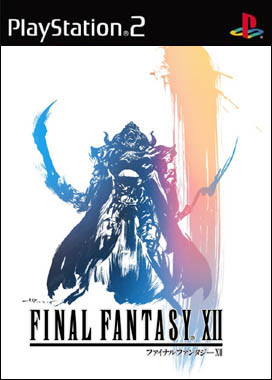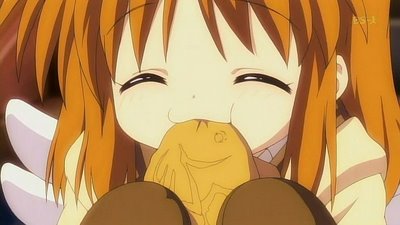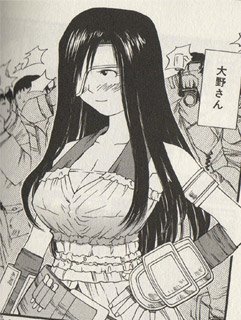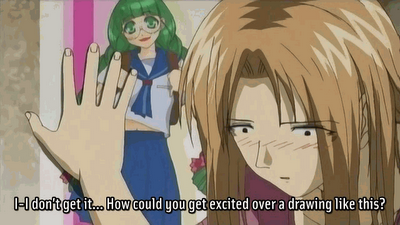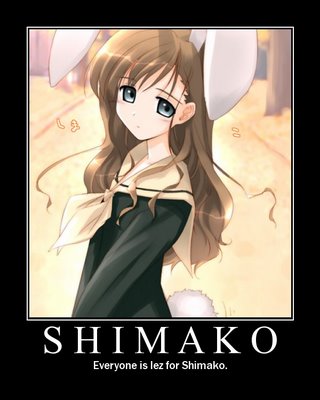Art = Life
Art is life and life is art.
Tuesday, October 31, 2006
Monday, October 30, 2006
Other New Shows
So Red Garden is good, so far. What else has Rob been checking out?
Read on and see, gentle audience.
Hataraki Man
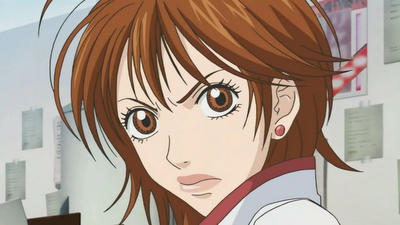
A fairly standard josei-style show, Hataraki Man (literally "Working Man") tells the story of a strong-willed lady magazine editor who pursues her work with such fervor that her co-workers call her by the aforementioned nickname. As tired as I am of the Spunky But Vulnerable Woman Trying To Succeed In The Working World™ concept, I do find myself enjoying this show. It's more entertaining and intelligent than a lot of that kind of material, and it actually gives us - gasp! - interesting, nuanced characters that we can actually care about.
Anyway, my initial take is that Hataraki Man is going to be pretty fun. The first episode has our heroine Matsutaka breaking a story about a corrupt politician and wrestling with the decision of whether or not to reveal the identity of her informant, when doing so could actually protect that informant from taking the blame for the politician's crimes. Not a particularly original plot, but the characters, presentation, music, Matsutaka's "otoko switch" transformation into a super-journalist and many little jabs of humor make the episode work. I think I'll keep watching unless the quality declines.
Kanon (2006)
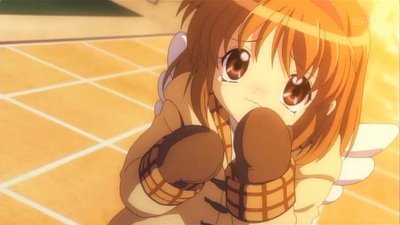
Kanon is a show with a huge amount of expectation surrounding it. For those of you who don't know, this series is based on the crazy popular video game of the same name, which was produced by fan-favorite developers Key back in 1999. Initially an eroge (i.e. porn game with sexay anime sex), the story proved to be so popular on its own that Key produced non-porn versions for the PC, Dreamcast, and PlayStation 2. The game was also adapted into an anime series by Toei back in 2002.
Kanon is a pretty big deal to many eroge and anime fans. It's essentially standard issue to anyone interested in eroge. It's held up as one of the finest examples of the medium, and of an adult-oriented game that effectively focuses more on story than sexual content. The plot, setting and characters have a charm about them that seems to have a profound effect on people. Even though it might not be a blockbuster property the likes of Evangelion, it has permeated otaku consciousness to a degree that you may find surprising. Characters from this story are frequently referenced in fan-created games, manga and artwork, and adorable Ayu up there has a fanbase that might actually rival that of anime fandom's leading lady Rei Ayanami.
Heck, this is where "sad girls in snow" came from. It's the origin of the name Piro, as well.
Anyway, it's difficult to fully explain the extent of what Kanon means to its fans, and honestly, I am not really qualified to do so, as I have never played any version of the game or seen the 2002 anime series.
Which brings us to the topic at hand. I've been aware of Kanon and its popularity for years, but have never taken the time to check it out for myself. So I figure that the release of Kyoto Animation's new anime version is the perfect opportunity to see what all the fuss is about. Why the remake? I'm not entirely certain, but it seems that the original adaptation just plain wasn't good enough, and after Kyoto's success with adapting another major Key game (coupled with the overall awesomeness of The Melancholy of Haruhi Suzumiya, I would imagine), the possibility of them doing a new version of Kanon was brought up by Key and accepted.
So, what do I think so far? Well, I like it. It's sweet and pretty and occasionally ridiculously cute, and I'm interested to see where the story is going. Kyoto is, unsurprisingly, doing a fine job with the show (as they always do), and so I trust them to bring me the best version of the story I'm going to get outside of the actual game. As for the story itself, I'm not going to hate it just because a lot of people love it unconditionally (I will never, ever commit such a despicable act). Instead, I am going to let the series work its magic on me and figure out what I think on my own.
It does indeed have magic, too. That I can tell already. I'm looking forward to finding out just how much.
La Corda D'Oro
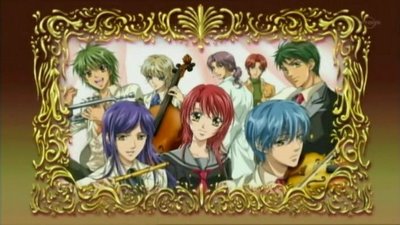
I wasn't even planning on giving this show a chance, but my enjoyment of the currently running Nodame Cantabile live-action series (which I'll write about later) and anticipation for the upcoming anime adaptation of the same property have given me an itch for some music-themed anime action.
So anyway, here's what La Corda is about: there's a girl, and she goes to an upper-class high school where the music students are considered to be the top rung of the social ladder. She doesn't appear to have any musical talent herself, but after a run-in with a music fairy (yup, "music fairy") who gives her a magical violin, she apparently becomes an instant virtuoso and enters the school's high-profile music competition, where she will presumably have dramatic and comedic dealings with the other musicians therein.
Honestly, I don't expect much from this series. However, I was not annoyed by the first episode, despite its bishounen- and fairy-driven attempts to drive me away. I'll give a more detailed report once I've seen more than the first episode.
Aaand that's it for the time being, I guess.
Sunday, October 29, 2006
Red Garden

Holy sh--.
The first episode of Red Garden has just about destroyed me.
I will not talk about the plot. What I will say is that the episode is steeped in mystery, and the atmosphere throughout is so oppressive that you know Something Not Good is going to happen at some point. The revelation that eventually comes at the end, while not particularly surprising, is a satisfying conclusion to a carefully constructed setup.

The best part of the whole episode is a musical number about two-thirds of the way through, where a character sings a lament to her lost friend. It's chilling and heartbreaking at the same time. The way her voice quivers and cracks as she half-whispers the words is like a knife through the heart. I really hope this show turns out to be a musical. That would make it even more of a stand out series than it already is.
My only concern at this point is that this is a Gonzo production, and they're somewhat notorious for making shows that start strong and end up fizzling out later on. If Red Garden can avoid that pitfall, it could really turn out to be something special.
Friday, October 27, 2006
Confoundingly Awesome

I'm not entirely certain what to think of this. Two Japanese guitar gods...and Brian Setzer? What the?
Anyway, regardless of how this show came about, this is Hotei (also Char and Brian Setzer) in concert. Everyone who does not attend will instantly become approximately .5% less cool than they are currently. Unfortunately, this includes myself. I am shamed. Shamed, I tell you.
MC Chris vs. KHII
This is just...so great. So, so great.
"Bitch this ain't a cutscene! Press 'A!'"
Found at VG Cats, which is also good stuff.
Thursday, October 26, 2006
Grading Genshiken
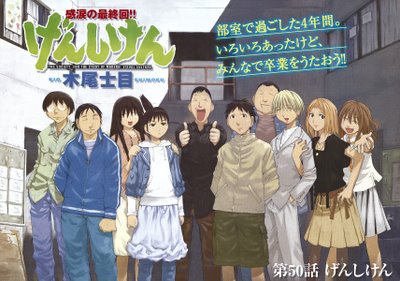
Oh yeah, so I've got to give a score to Genshiken at some point, don't I?
Alrighty then...
Pluses:
+It really is the best representation of otaku culture I've ever seen in anime (or in any other storytelling medium, for that matter).
+It tells stories that are believable and honest and never steps outside the realm of reason.
+One of the best parts of the story is the gradual but definite growth of Saki, the anti-otaku girlfriend of one of the guys and sort of the main character of the series.
+All the other characters are great too.
+Like Ohno.
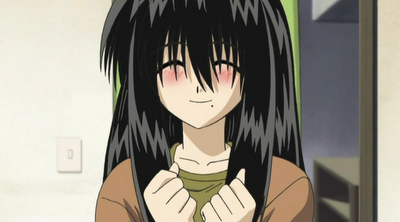
+I looove Ohno.
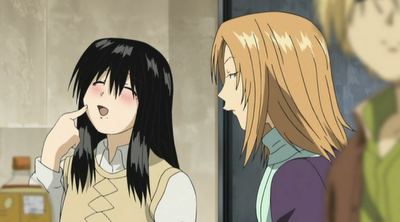
+The humor is pretty much always on. I laughed out loud several times during the show. And it's not really packed with wacky slapstick antics either (though there are a few punches thrown here and there).
+Every other aspect of the show is excellent as well.
Minuses:
-There really isn't an overarching plot. Just the characters going about their lives.
-There needs to be MORE. Moremoremore.
Rebuttal Pluses:
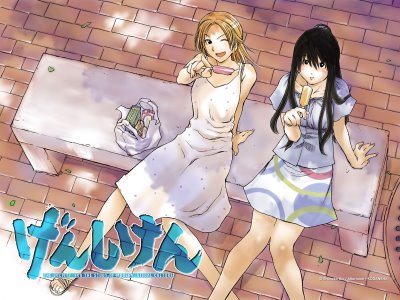
+OHNO
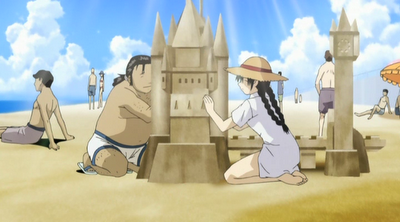
+Also, Sand-Castle of Cagliostro. Plus Ohno.
Score: 8/10 (Don't Miss It)
Tuesday, October 24, 2006
Firefox 2.0
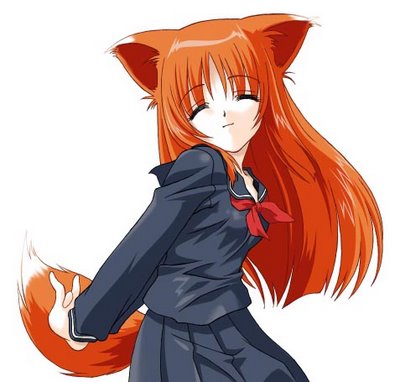
Speaking of 2's: Firefox 2.0, baby.
My favorite part? Real-time spell checking.
Which totally just freaked out when I wrote that as "spellchecking."
Anyway, this'll make writing Blogger posts a bunch more convenient.
It can do other things too, so, like, grab it and stuff. It's much, much cooler than IE7 (i.e. "We gots tabz now DUR.").
CUTE BACK THE WEB, PEOPLE.
Pop Life Suicide 2

Pop Life Suicide 2 = Smaller venue, somewhat more intimate concert, more old-school punk type performance, amazing show. Definitely worth picking up.
Monday, October 23, 2006
Pop Life Suicide 1

Okay, I am completely blown away by Judy and Mary's Pop Life Suicide 1 (and I'll be getting to part 2 soon enough). I mean, I've seen them perform live before, in music videos and TV appearances, but this...is just ridiculous. This is Judy and Mary unleashed, I guess. In top form, at a great venue, at the peak of their career.
It is a thing to behold, I'll tell you. The boundless energy that the band always had on stage is heightened here somehow, taken to levels I haven't seen from them before. Everyone is doing exactly what they always did, but just...more, I guess. Yuki commands the universe on stage, as always, but this might be the most pristine example of her mastery of performance that I've seen. Igarashi is both surgical and boisterous at the drums, merrily singing along with Yuki even when there's no mic on him. Again, that's pretty normal, but he seems to be just a little more powerful here somehow. Even the generally stone-faced Onda appears to be having more fun than he often does, and his inventive bass playing stands out a bit more than usual.
And then there's Takuya. I've really never given Takuya enough credit in the past. I know that he handled a lot of Judy and Mary's songwriting and that his energy on stage was always great. I knew that his guitar riffs were some of the most creative ever crafted in the pop/punk genre. I knew that he was always full of surprises when he performed, pulling out crazy solos and silly stunts to entertain the audience. However, I always got a sense of...I don't know...sloppiness from his live performances. He'd miss strings on the guitar during a solo or sing a few off-color notes, and it would just stand out as being unprofessional, especially when the other three band members were always so flawless.
Well, whether or not that perception of sloppiness I had was ever really accurate, it's gone now. Pop Life Suicide 1 shows everything that Takuya was capable of, and it turns out to be a lot more than I ever expected. The man is on fire here, with every riff right on, every vocal part nicely done, and pretty much every solo a jaw-dropper. He really does some amazing things here, and his performance has increased my level of respect for him by several orders of magnitude.
So yeah, Pop Life Suicide 1 is just like any other Judy and Mary performance, only more. It's Judy and Mary at 110%. It's a definite must-see for JAM fans, and might just turn around a few people who have never heard them or never liked them. Is it worth 50+ bucks (with shipping) when it only has about an hour of content on it? Well, yeah. To me it is. JAM fans might want to think of it this way: it's probably not a whole lot more than a ticket to the concert (plus transportation and food) would have cost (and that's if you were in Japan at the time), and this is an experience you can relive whenever you want.
Of course, if you do get this disc (and/or its partner, which chronicles a different show) you might end up in the situation I'm in right now, which is trying to figure out how to afford Judy and Mary's other concert videos.
Sunday, October 22, 2006
Everything's Exceptional

Been giving out a lot of high-end anime scores here. My review scores may seem a bit skewed as a result. But the reality is that I just don't watch a whole lot of stuff that would rate below a 6 on my scale. Not because I'm overly positive about everything, but because I tend to avoid stuff I'm not going to really love. Unfortunately, this means that it might be difficult to get an idea of the scope of the rating system I use, but I guess that if you like one thing that I give a good score to, you'll probably like all of them.
Kamichu!
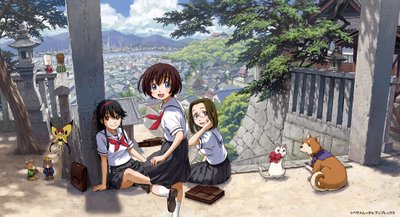
So the lovely little slice-of-a-god's-life series Kamichu! is three quarters of the way through its American DVD release, and that...well, it gives me a convenient excuse to talk about the show, is what it does.
So, quick and dirty explanation: Yurie is a regular middle school girl. She becomes a god. She's great because, while she has the cuteness factor one would expect from her kind of character, she's also selfish and lazy and imperfect like real kids her age often are. She lies. She makes mistakes. She constantly pesters her younger brother, who is a lot more responsible than she is most of the time. She's got a huge crush on a boy in her class, which makes her do silly things sometimes. And all that makes her a fun and interesting character.
Yurie is new to godhood, which means having to learn to use her powers and deal with the responsibilities her position brings. It's rough going at times, but she learns quickly and never gives up. Naturally, she's got friends to help her along the way, like the cool-headed and steadfast Mitsue, the exuberant shrine maiden Matsuri who's always looking for ways to use Yurie's divinity to bring money into her struggling shrine, her 3-piece team of personal helper spirits who call themselves "Team Shiawase" (i.e. "Team Happiness"), the god Yashima-sama, who is more interested in becoming a rock star than taking care of his godly duties, her cat Tama, who (slight spoiler) becomes the host body for a god of misfortune, and all of the other gods and goddesses in the world around her. Her family is loving and supportive as well; even her brother, who is actually pretty patient with his sometimes exasperating sister.
And so Yurie has various adventures as she struggles both with being a god and a middle-school student in love. The show is as much about everyday life as it is about magic and miracles, and can be just as interesting when showing Yurie spending a whole winter's day lounging under her family's kotatsu as it is when it's showing her stopping a wayward typhoon that she accidentally created.
With its careful pacing and focus on the beauty of life and the world around the characters, Kamichu! could easily be referred to as Ghibli-esqe (and has been already, I am sure). The color scheme and overall design of the series also do little to deflect this comparison. Of course, being compared to something from the legendary studio is only a problem if the show can't hold up to those lofty standards, and honestly, Kamichu! is strong enough in overall production quality to avoid seeming like a watered-down Ghibli film.
The soundtrack is suitably nice too, with an ending theme sung by Yurie's voice actress, who also happens to be a member of the J-pop group Bon-Bon Blanco. Be forewarned, however: this ending theme is accompanied by a simple little ending sequence that is about an 11.5 on the cute Richter scale. I've never enjoyed maracas so much.
Kamichu! is a good show. A really good show. It's sweet and pleasant and funny and loaded with great episodes. The adaptation from the original manga is accomplished with confidence and skill, which is no surprise when you consider that the anime was produced by the team known as Besame Mucho, who - along with artist Hanaharu Naruko - were responsible for creating the manga in the first place. I recommend this show to pretty much any fan of anime, and especially to people who like stuff that makes them feel all warm and fuzzy inside.
Score: 8/10 (Don't Miss It)
Friday, October 20, 2006
Genshiken
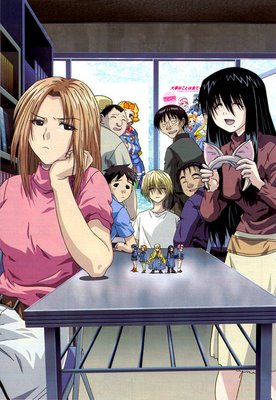
Genshiken is actually a really good show too, and not just a bountiful source of humorous .gifs. It is definitely the most accurate portrayal of anime/manga fandom I've ever seen in anime form. Granted, I still have yet to see Otaku no Video, but until then Genshiken takes the otaku cake in my book.
There are two major things that make Genshiken stand out from other anime of its type:
1) Dead-on understanding of otaku culture. The series does a great job of showing the various aspects of anime/manga fandom, from discussing the material with friends to playing video games (both of the regular and "adult" varieties) to cosplaying to building models to going to doujin conventions. If you're a part of this culture, you will definitely recognize elements of yourself and your community in this series. And that's great, because...
2) The show never stoops to stereotyping or putting down the characters or their interests. The cast is primarily made up of members of a college club that focuses on watching anime, reading manga, and playing video games. Yeah, most of the group is male. Yeah, they're not the most attractive bunch (on the whole, anyway). And yeah, most of the guys aren't exactly ladies men. But those traits are never exaggerated to the point of caricature. Even a character like Madarame (the guy who gave us the lesson below), who is more interested in hentai than real women, is perfectly capable of conversing with girls without becoming "comically" paralyzed or quietly lusting after them. I like that. These are real people with real interests and real personalities, and while I generally expect that from any anime I watch, it's especially good to see it in a show about otaku culture, which is so often misrepresented for the sake of comedy.
Overall, it's pretty great to see a show that is about actual fandom and not some absurd parody of it. The steady stream of references (both obvious and obscure) to anime, manga and games in the series make it all that much more enjoyable, and further prove that its creators understand the subject matter at hand.
I mean, seriously, nobody who was ignorant about otaku culture would make a joke about cosplaying as Bridget.
Ewwww, Bridget...
*shudder*
Umm, I guess that's all I need to say about Genshiken for now. I'll probably toss out a (pretty high) score when I'm done watching it.
Neverwinter Nights
Hey, internet people, guess what! Neverwinter Nights is, like, a totally awesome game and stuff! Good thing you have me around to give you all the cutting-edge gaming newz, right?
Right.
So, I've finally discovered for myself what a great game Neverwinter Nights is...and only about four years after everyone else did (*SWEAT DROP* teeheehee). I'm playing a Wizard, which should come as no surprise to anyone who knows my penchant for spellcasting characters. I think I'll multi-class her at some point, but I doubt she'll need it. Who needs weapon feats when you've got Otto's Irresistible Dance?
That's right, dance, you bastards! DANCE UNTIL I TELL YOU TO STOP.
WITH FIREBALLS.
...oops, a little research tells me that OID didn't actually make it into the game.
Wait, no OID?
NO OID?!
RAGE.
*pout*
Fine. Fine. I'll use crappy old Meteor Swarm or something to destroy my enemies. Maybe Gate up a Balor or whatever. I can do that, I guess. I suppose there doesn't have to be uncontrollable dancing everywhere I go. I'll just get things done the boring way. With violence.
Well, I guess I still like the game, despite this one terrible oversight on the part of the developers.
Maybe OID will show up in NWN 2. Pretty graphics and improved gameplay? BAH! I want dancing, people. Dancing!
Wednesday, October 18, 2006
Guild Wars Revisited
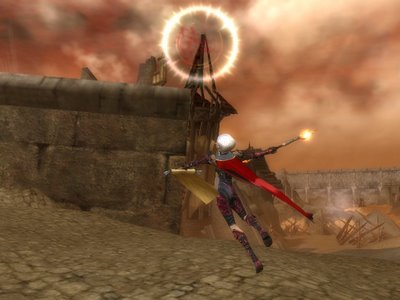
So I've been messing around in Guild Wars again recently. I had started playing way back when the first chapter came out, and it served as my introduction to the world of MMORPGs. Eventually I "upgraded" to World of Warcraft and got sucked into that for about six months. I came out of that gasping for air and wondering where the heck the rest of my life had gone. I mean, it's not that I don't appreciate what Blizzard has done with the game. In fact, I think it's brilliant. It's just such a huge time sink, and even after all the months I had spent with it things were actually threatening to get worse. After I hit level 60 the only way to keep enjoying the game to the fullest extent would have been to get involved with huge, heavily coordinated raids and basically structure my entire life around playing the game. I actually did consider doing that for a little while, but eventually what little sense of personal responsibility I have won out and I pulled myself away from the whole thing permanently.
But anyway, this post isn't about WoW. It's about Guild Wars, and about why I'm enjoying my casual revisit to the game.
And I guess "casual" is the key here. See, Guild Wars is a game you can play like a game, rather than an extension of your life. Playing the entire game solo (with the exception of a handful of special, and entirely optional, areas) is a perfectly viable option, and quests are generally quick and not too terribly difficult. The instanced nature of the world (i.e. whenever you leave town the world is generated just for your party) also means that you never have to wait for someone else to clear out of an area before you can do a quest. Oh, and that reminds me: there is a distinct, and entirely welcome, lack of collection quests. No spending two hours killing yetis or bears or whatever trying to collect 20 whatever to give to whatever person for no good reason. On the contrary, every quest given to you in Guild Wars affects the world in some way, however large or small, and makes you actually feel like you're accomplishing something.
Ah yes, accomplishing something. Now, it could be argued that nothing you do in a video game really accomplishes anything in the grand scheme of things, but when operating within the confines of a game world we gamers like to feel like our efforts are meaningful to some extent. By this measure, Guild Wars is a more satisfying experience than WoW ever was. Being a game with a finite (and fairly interesting) story, Guild Wars is a game that you progress through, working ever closer to uncovering the answers to some pretty intriguing mysteries. And when the story is done, that's it. You can get involved in PvP, which is in many ways what Guild Wars is really all about, or you can hang it up and move on, feeling satisfied that you actually "completed" the game.
That sense of completion is something I never really got from WoW. But with Guild Wars, once you finish the story there are only a handful of things left to do beyond PvP (at least in Chapter 1, which is what I'm playing). You can run down to the Underworld or the Fissure of Woe (both max-level areas with great drops and armor), or you can explore Grenth's Footprint and Sorrow's Furnace, where you'll find some of the most difficult battles in Chapter 1 and the ultimate weapons for each character type.
And yeah, that's a lot of stuff right there, but all of it is entirely optional unless you want to make your character as powerful as possible. And even if you do want to get all the best gear out there, it's not that much of a pain. The most statistically powerful armor in the game can be purchased from an armorer in one of the game's final outposts. The ultimate weapon for each character is always dropped by a particular boss with a standard location. Even if you want to get completely decked out with the best equipment and see everything that Chapter 1 has to offer, it isn't going to take months and months of raids to do so.
Time is such an important factor, too. You spend so much time doing what amounts to nothing in WoW. My daily herb run, in which I would travel around the world to collect herbs to sell at the auction house, would take between one and two hours. And I did all that before I even started doing quests. And then there's travel time. I don't have a guess as to what percentage of your game time in WoW is spent just traveling, but it's a depressing amount. Staring at your character's back while she bobs up and down on the back of a giant bat for ten minutes is not compelling gameplay. Seriously.
By contrast, Guild Wars features virtually no travel time. Every time you're out in the field you're there to do a quest, and going out to do quests will often lead you to new outposts and cities. And here's the wonderful thing: once you've visited a new location you can teleport there instantaneously at any time. Yes. Just got a quest in one location that requires you to travel to the outpost you were at ten minutes ago? Teleport there! Sexy.
Is Guild Wars unequivocally better than World of Warcraft? Nope, but it's a different creature, and I'm only discovering now that it had already solved many of my personal problems with WoW before the game even came out.
So, uh, yeah. Tired of MMORPGS? Never liked them in the first place? You might still enjoy Guild Wars. Anyway, there's no subscription fee, so there's not much harm in picking the game up and giving it a try. And with Chapter 2 supposedly rocking pretty hard and Chapter 3 due out by the end of the year, there is a ton of content waiting for you if you find yourself interested.
Every Repost Is A Repost Repost
There. Just wanted to preserve a few posts from a very short-lived blog I ran and quickly canned a little while ago. And now back to our regularly scheduled newness.
P.S. Don't ask me why I felt the need to recycle that Maribato!+ post. I think it has something to do with that screenshot.
Maribato!+
Reposted from an older blog. Originally posted on 09/03/06.
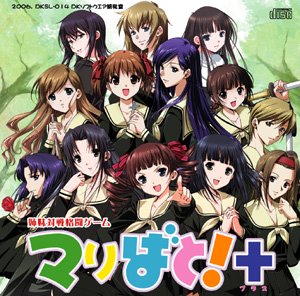
Maribato!+: the newest version of the fighting game based on Maria-sama ga Miteru.
Yeah, you heard me. A fighting game based on a shoujo anime about girls at a Japanese Catholic school in vaguely lesbian relationships. It is made of win and awesome.
Only from Maribato can you get a screenshot like this:
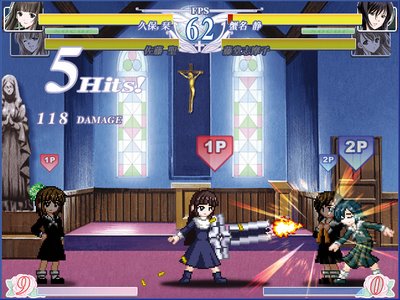
It's cute, it's a Trigun reference, and it's borderline sacreligious!
WIN AND AWESOME.
Honey And Clover
Reposted from an older blog. Originally posted on 08/31/06.
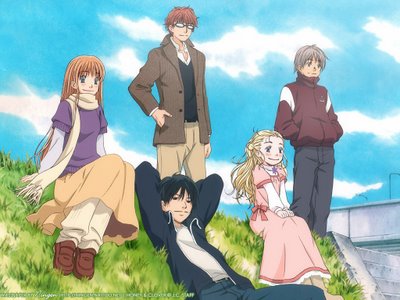
I don't know where to begin talking about Honey and Clover. I know that it has already earned a place as one of my favorite anime series, and that it has moved me in a way that only the best series I've ever seen have. I know that I love the characters, the people, that populate the world of the story. I know that I am always disappointed when an episode ends. I know that it is one of those rare works of art that, if it hits you right, will change you permanently and stay with you for the rest of your life.
I don't know what else to say. It's too good for my stupid words. But stupid words will have to do, I suppose, and I have to say something more than, "You must watch this series at all costs."
So let's start with the basics. Honey and Clover is a drama series that deals with the lives, loves and dreams of a group of students at a Tokyo art college, along with their friends, family members and co-workers.
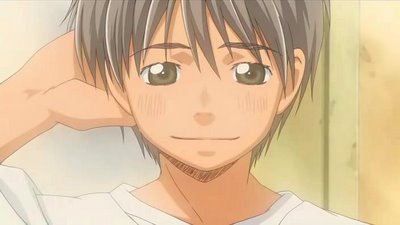
The de facto main character of the series is Yuuta Takemoto, who is beginning his second year when the story begins. Takemoto (we'll use last names for a few of the characters, as that's how they're addressed in the series) is a fairly normal college youth; he's poor, he lives in a low-rent apartment building, he likes to hang out with his friends, etc. He's in art school because he likes to create things, but doesn't really know what he wants to do with his life beyond that.
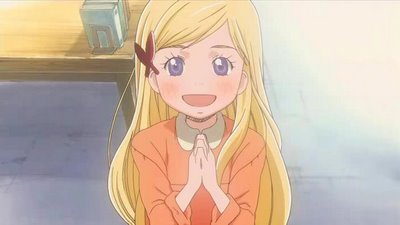
Takemoto's life is thrown for a loop when he meets Hagumi Hanamoto. Hagu is a small, childlike, and extremely skilled artist who - despite having the appearance and personality of a child - is actually college aged and about to begin attending Takemoto's school. Hagu is adorable. She's eccentric. She's lovable. Everyone who comes into contact with her is astounded by her art, and is amazed to see the world through her eyes.
Unfortunately, being such a great artist has its drawbacks. Not particularly resilient to begin with, Hagu is under constant stress that wreaks havoc with her physical and mental health. She is always pressured to create new works for art galleries and other benefactors, and is subject to the unwanted attention of her professors, who want to make sure she doesn't "waste" her talent by turning down opportunities for work. She also faces scorn from her classmates, who don't appreciate the attention she gets from everyone around her and don't understand what she's going through. Furthermore, she is perpetually in battle with herself, trying to find the will and strength to create freely and at her own pace even with the stresses that surround her.
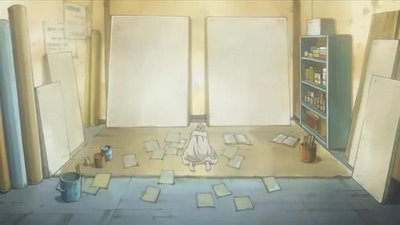
Takemoto falls in love with Hagu the very first time he sees her, but the enormity of her talent puts a gap between them that he simply cannot bridge. The two become good friends, with her feeling very comfortable and comforted around him, but he knows that he can do nothing to help her in her struggles. This impotence, combined with his sense of awe toward the quality of her work, leads him to question himself and what he's doing with his life, and his search for a purpose and direction becomes a major thread of the series.
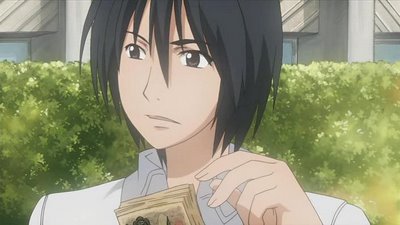
The relationship between Takemoto and Hagu is further complicated by Shinobu Morita, who might be the only person in Hagu's life who can fully understand her and interact with her on the level that she needs. Morita is like Hagu in many ways - he's an unusually gifted artist, he understands the value of acting like a kid sometimes, and his eccentric nature separates him from other people - but unlike Hagu, he is free-spirited and somewhat immune to life's troubles. He's something of an enigma. He can be completely selfish and silly one moment, and surprisingly insightful and sensitive in another. He often disappears for days, weeks, or even months at a time, and returns without notice, zombified from sleep deprivation and carrying a wad of cash of unknown origin. He's just an unpredictable person in general, but the love he shows for his friends earns their affection and understanding.
Like Takemoto, Morita falls for Hagu almost immediately, initially using her as an unwilling subject for his unusual works of art but eventually realizing that his interest in her extends beyond that. Like Takemoto, Morita is moved by Hagu's creative works, but unlike Takemoto, he has the ability to return that favor to Hagu. His work inspires her the way hers inspires other people, and the two come to a silent understanding that they each want to live up to the other.
I could go on about the Takemoto/Hagu/Morita situation all day, but there are other stories going on in Honey and Clover and other characters who deserve our attention.
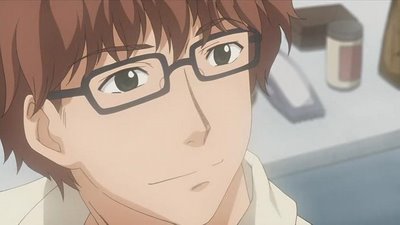
Takumi Mayama is a friend of Takemoto, Hagu and Morita, and is just about to graduate from the school at the beginning of the series. There are two major sides to Mayama's personality: one is a very sweet and generous person, and the other is...well, a stalker. Mayama is in love with a woman named Rika Harada, who has hired him to help with her small (two people, including Mayama) design company. Rika is a broken, damaged woman, both inside and out, and this vulnerability leads to Mayama developing a sense of protectiveness over her. Unfortunately, this protectiveness can go too far, pushing Mayama to do things that are just a little off kilter from healthy behavior.
Regardless of his sometimes creepy actions, Mayama obviously has a big heart and a (relatively) good head on his shoulders. The question is whether he will end up helping or hurting Rika in the end.
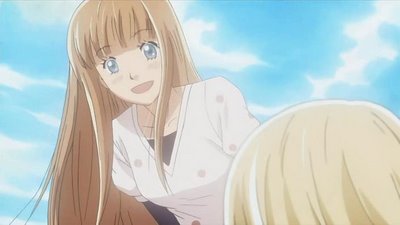
A pottery student at the school, Ayumi Yamada is also part of the group of friends at the core of the show. Ayu's life is one that is filled with heartbreak and longing. She is utterly, painfully in love with Mayama, and even though she knows she will never have him, she simply cannot let go of her feelings for him. It's hard to see her go through these emotions, especially because she is such a good and kind person. She's very strong in many ways, but everything involving Mayama just destroys her. What's worse is how much her feelings for Mayama hold her back. Aside from a handful of exceptions, pretty much every guy Ayu comes into contact with on a regular basis is completely taken with her. She has at least two entourages of good young men who worship the ground that she walks on. Unfortunately, she simply can't feel the way about any of them the way that she feels about Mayama.
The series is a difficult ride for Ayu, as she is perpetually in some stage of heartsickness. Her story is about whether or not she can accept the things she can't have and let go of the feelings that have defined her for so long.
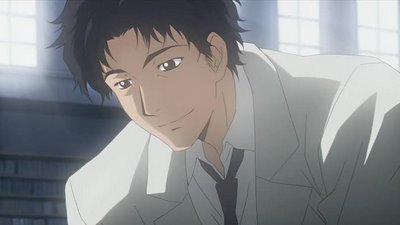
Shuuji Hanamoto is a professor at the college and is sort of the father figure of the group. Most of their gatherings take place in his office or home. Shuuji is Hagu's father's cousin, and it was at his suggestion that she moved to Tokyo to live with him and go to school. Shuuji has a very strong relationship with Hagu. One gets the impression that she is not particularly close to her family, and that Shuuji has stepped in to fill in the emotional gaps left by that estrangement. Shuuji loves Hagu as if she were his own daughter, and would do anything at all to ensure her happiness. Hagu feels just as strongly about him, making the two pretty much inseparable. Shuuji is the one who is there for Hagu during the truly difficult times, even though he admits he can't interact with her on the level that Morita can.
Shuuji is sort of a hub character for the show. He provides everyone with a place to meet, and has a hand in supporting all of the major cast members to some extent. He doesn't have to deal with the same kind of emotional turmoil that the others are going through (at least not in the present), so he focuses mainly on taking care of Hagu and doing his job as a teacher, both inside the classroom and out.
While those six make up the primary cast of the show, there are several other wonderful characters that play important roles as well. Taking the time to describe them all would make this post far too long, however, and meeting new characters and seeing how they affect the others is part of the fun of the series.
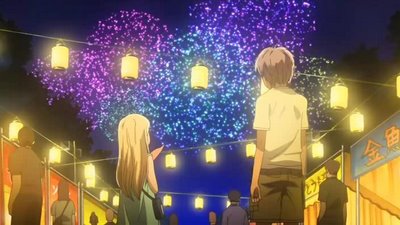
The show is exceptional from a technical standpoint. The folks at J.C. Staff (and all the other numerous studios that lent a hand to the production) really went for broke making the series look, flow, and feel as beautiful as possible at all times. The show may have been made on a television budget, but the consistently solid artwork and animation and the detailed backgrounds do little to give that away. Also notable is the fact that the character designs stick reasonably close to those of the original manga. Oftentimes character artwork ends up being altered significantly in the transition from manga to anime, usually to make the characters easier to draw/animate, but Honey and Clover strives to be faithful to the manga designs, and does a fine job in that department.
The only real complaint I have about the art is that the characters tend to stray from their standard models on occasion. Not in the usual exaggerated anime facial expressions kind of way, which is completely intentional, but on a more subtle level, where you'll notice that a character's hair or eyes or facial structure are different from one shot to the next. This is a fairly common occurance in television anime, but it is a fault that I have to bring up. It generally doesn't detract from the show, however, and I'm fairly certain that many of the most noticable design fluctuations are the restult of moments where the creators have gone out of their way to accurately reproduce a panel from the manga, even when doing so means making a character look a bit different from usual.
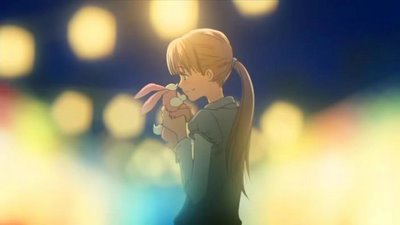
Voice performances are beyond the beyond; suitably effective for a series filled with this much emotion and drama. Yuji Ueda is brilliant as the manic and aloof Morita. Haruka Kudou is adorable as Hagu, and gives her voice an underlying maturity that reminds the viewer that Hagu is much older than she looks and acts most of the time. Hiroshi Kamiya nails Takemoto's sincerety, confusion and frustration, grounding the series with his narration. Mikako Takahashi masterfully handles the difficult job of playing the perpetually heartbroken Ayumi, making her sympathetic without being pathetic and strong but believably vulnerable. Really, everyone involved nails his/her character. Even second-tier characters have memorable performances backing them.
Finally, we come to the music. The title Honey and Clover reportedly comes from the names of author Chika Umino's two favorite albums, by artists Spitz and Suga Shikao, respectively. Appropriately, music from both acts is used frequently in the series, along with songs from other popular Japanese artists like Suneohair. Topping it all off are two opening themes from the iminitable Yuki, and a nice backing soundtrack that makes effective use of melodies lifted from the opening and ending themes.
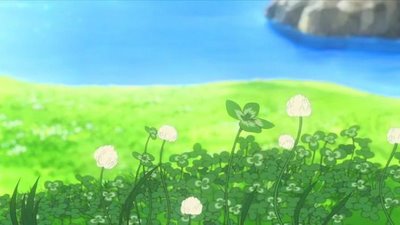
So those are the details you need to know about Honey and Clover. Unfortunately, none of that really conveys the true magic of the series, which is something you can only experience by actually watching it. And watch it you should. Honey and Clover is a must, not only for fans of drama and romance, but for all fans of quality anime.
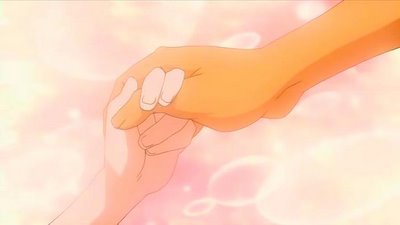
Score: 9/10 (Essential)
Murdering Demons For Fun And Profit
Reposted from an older blog. Originally posted on 08/29/06.
Yeah, so I'm not exactly a top of the line, cutting edge gamer. The two games I've been playing the most recently are a GBA game based on a card game and Diablo II: Lord of Destruction. What can I say, though? They're both tons of fun, and they both tap into my inherent need to manage and manipulate complex systems. Also, my need to LAY WASTE TO ALL THOSE TO DARE STAND BEFORE ME.
Yes. That too.
Seeing as anyone who would want to know the basics about LoD most likely already does, let's get into talking about my current experience with the game, and my current character, of whom I am very proud.
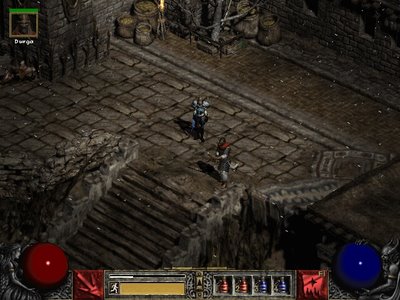
Meet Necrophage. He's a (currently) level 86 Necromancer, and the world of Diablo II belongs to him. No, seriously.
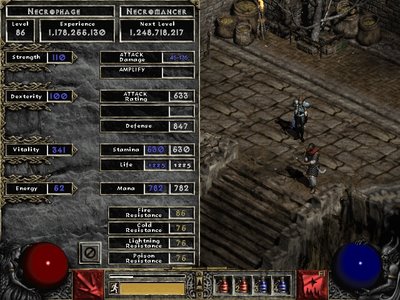
The funny thing is, if you look at his stats, he's nothing to write home about. Anyone who plays/has played LoD online to any serious degree might chuckle at his rather unspectacular numbers. His equipment, too, while impressive in its own right, is less than ideal. Take a look:
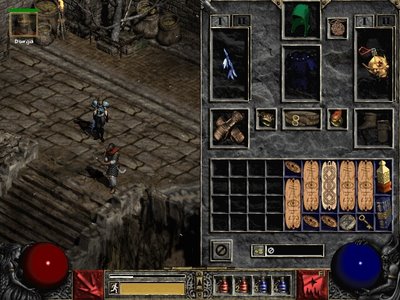
Helm: Harlequin Crest (Socketed with a Thul Rune)
Armor: Skin of the Vipermagi (Socketed with an Ort Rune)
Weapon: Carin Shard (Socketed with an Ist Rune)
Shield: Homunculus (Socketed with a Perfect Diamond)
Gloves: Frostburn
Belt: Gloom's Trap
Boots: Infernostride
Amulet: Rare with +1 to Necro skills, +35 Poison Resist and +15 to the others, some dex, some life, and 75% poison length reduction.
Ring 1: Raven Frost
Ring 2: Dwarf Star
(Non-Diablo II players might want to hop on over to The Arreat Summit for more information on all this stuff.)
Yes, battle.net players, you are free to laugh at my lack of an Enigma, Arachnid Mesh, Marrowwalk, Annihilus, or Hellfire Torch. It's okay. I understand. I am at peace with Necrophage's utter lack of leet-ness.
Why? Because even without the best equipment setup he could have, he still makes short work of everything the offline game has to offer. Hell Baal? Joke. Hell Diablo? Joke. Hell Mephisto? HAHAHAHAHAHAHAAAAA. With the exception of the one time he got double-teamed by a Dark Shape boss with an Extra Strong modifier and another boss who locked him down with Holy Freeze before he could get away, he has never died on Hell difficulty, and he probably never will again. I've done Hell Pit/Countess/Meph/Diablo/Baal runs almost every day for two weeks now, and he's never been in danger of being killed once.
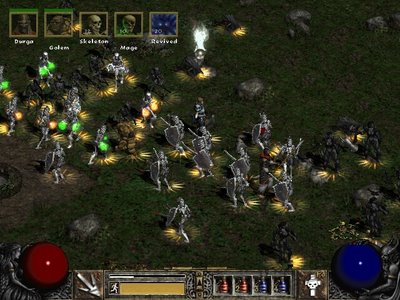
So what makes the game run so smoothly for our friend Necrophage? Well, for one thing, Necromancers are seriously just way too powerful. It's pretty silly how unbalanced they are compared to, say, an Amazon. But the real key to his power - as is the case with every character - is his build.
Necrophage is a standard Fishymancer build, with the only difference in approach being that I'm investing my spare points in Raise Skeletal Mage. After seeing this solo Uber Tristram run and hearing that player sing the praises of using skellie mages, I decided that would be the best outlet for my spare points, and honestly, I couldn't be happier. With a current base army of 24 minions and a current total army of 44 when I'm fully up and running, I think that the mages help a great deal in numbers alone. However, their real use comes from their ranged capability and - more importantly - their ability to prevent monster heal on Hell (poison mages) and slow Super Uniques (cold mages). With a group of cold mages + clay golem + Decrepify, I can pretty much lock down any boss to the extent where there isn't really a fight going on anymore.
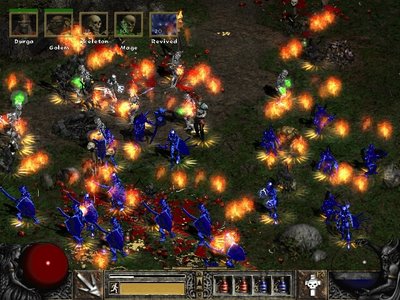
Besides, where else was I gonna put those extra points? With +skills I have 20 Revive, 10+ to all my curses and 13 in golems and Golem Mastery. Skellie mages were the perfect investment beyond that. I haven't regretted the decision once since I made it.
All told, his Skill Point distribution looks like this:
Summoning:
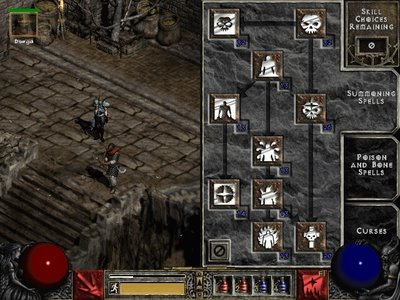
Poison and Bone:
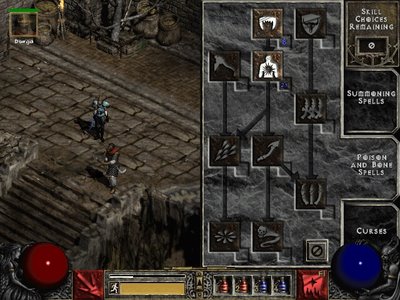
Curses:
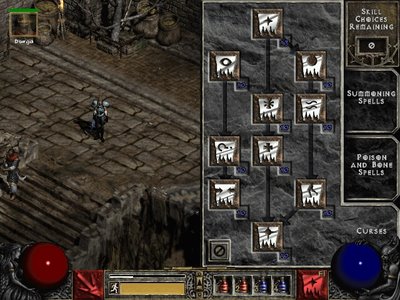
And with all that he's basically invincible. These numbers aren't all that difficult to achieve, either. Remember, he only gets one +skill level from the Skin and one from his amulet. I've also chosen to use the Carin Shard instead of the Arm of King Leoric, on account of the Arm's tendency to get me trapped in Bone Prisons when I get hit, but the Arm would provide even more +skills. I make up for the lost +skills with charms, but yeah, there's definitely room for improvement. The point is that he doesn't need it.
The only other build-related issue to discuss is my choice of stat point distribution. Astute players might have noticed that I've chosen to invest in Energy over Dexterity: i.e. life over blocking. Whichever you choose is a matter of play style, but I am very happy with the fact that while I may not block very often (I have about 30% chance), I don't get hurt particularly badly when I do take a hit. I'd rather be able to soak up the damage from a surprise rush from a group of Moon Lords than have to rely on blocking to save me. Besides, taking the time to block means having less of a chance to cast Attract or Confuse to get myself out of sticky situations.
Anyway, that's pretty much all you need to know about Necrophage, and about my thoughts on LoD Necromancers in general. To sum it up: if you want to build a Necro, I suggest using Fishy's guide, investing in Raise Skeletal Mage beyond that, putting enough points in Strength to wear your gear and then dumping the rest in Energy, unless you want to drop a few in dex just to get a little extra blocking. That's pretty much what I've done, and I've never had a Diablo II character who was anywhere near this powerful.
And now that I've driven off anyone who cared enough to even start reading this post, I shall flee into the night. Er, the day. Afternoon. Whatever.
Tuesday, October 17, 2006
Koi Kaze
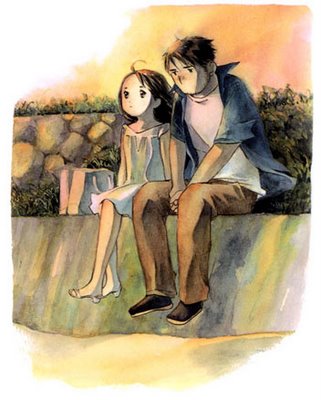
Koi Kaze is a sweet but positively heart-wrenching series. Every moment of it hurts. Every scene that should be beautiful is tinged with sadness. Everything that should be right is wrong.
And it's amazing.
But I'm getting ahead of myself. Long story short, Koi Kaze is about forbidden - absolutely impossible - love, and how two people deal with themselves, each other, and the world around them when faced with it. In essence, it's about something completely horrible when observed from the outside, but that feels more perfect than anything else in the world to the people involved in it.
Koushirou is a 27-year-old guy who lives with his dad in the city and works at a company that plans weddings. He has never been particularly capable of managing his feelings, nor able to really connect with anyone else on any truly significant level. His girlfriend recently broke up with him because he had not been able to commit to her in the way that she wanted. While he is upset by this, he seems to be taking it in stride, as he apparently was never able to invest much in the relationship anyway.
Nanoka is a 15-year-old girl who is moving to the same city to reduce the commute time to her new high school. Her parents divorced when she was very young, and she has been living with her mother in a town about an hour away since then. However, she is now moving back in with her father, as he lives much closer to the school. Nanoka is charming and outgoing and pretty, but nevertheless was recently rejected by a boy she had liked for a very long time. She is still in pain over the loss, and wishes she could just discard the feelings she carries for him.
Koushirou and Nanoka meet by chance one day when she drops her train pass on a platform and he returns it to her. They both feel something unusual in the moment that they first meet, but they part soon afterward. However, another chance meeting later on leads the two into an impromptu date when Nanoka asks Koushirou to pass the time with her while she waits for a meeting with her father. The two go to a nearby amusement park and end up on the ferris wheel, where Nanoka tells Koushirou about being rejected by the boy, and about how she wants to toss her feelings away. In response, Koushirou tells Nanoka that he and his girlfriend have just broken up, and that he's not sure that he ever loved her in the first place. He says that a love as straightforward and simple as what Nanoka feels is something that should be treasured, even if things can't work out the way that she wants. Realizing that these are his true feelings about love and that he has not ever loved anyone from the bottom of his heart, Koushirou breaks down and cries in front of Nanoka. Comforting him, she gently places her hand on his head.
And in that moment, the two fall in love.
They don't know it right away, but over time they both come to understand that the feelings they have for each other are romantic, real, and world-shattering.
Now, I mentioned that this show is about forbidden love. The fact that Koushirou is 27 and Nanoka is only 15 is enough to make many people squirm. But the legal marrying age in Japan is 16, and massive-age-difference stories aren't all that uncommon.
No, the true taboo here is something much greater. Something that is a truly insurmountable obstacle. Something that will bring the two doubt, confusion, pain, self-loathing, and even contemplations of suicide. Something that very few viewers of the show will be able to condone, or even forgive.
You see, after Koushirou and Nanoka get off the ferris wheel, they meet with her father.
Who also happens to be Koushirou's father.
The two haven't seen each other since their parents separated, when Nanoka was still in diapers, and did not recognize each other when they met.
The two are brother and sister, and they love each other more than anything in the universe.
Koushirou recognizes his feelings first, and hates himself for them. His horror at the implications of his thoughts causes him to attempt to distance himself from Nanoka, but no matter how hard he tries to shut her out her kindness and his feelings always end up winning in the end. Regardless, he is unable to accept how he feels and tries to run away from it at every opportunity.
Nanoka, for her part, eventually realizes that she feels the same way about Koushirou, and - in her youthful naivety - is much more accepting of her love. As a result, she fights to get close to Koushirou, even as he tries his best to stay away.
What follows is a story of continuous heartbreak, both for the characters involved and for the viewer. Both Koushirou and Nanoka know their love is wrong, but neither can deny how powerful it is. By the same token, most people who watch the show won't be able to understand how the two could feel the way they do, but in the end it's difficult not to sympathize with them and share their pain.
The journey to the conclusion of this series is not an easy one, and I wouldn't recommend it to many people. However, the story is so profound and the very touchy subject matter so carefully handled that I must give the show my approval and respect.
It doesn't hurt that the art design is lovely (especially for anything related to Nanoka), that the music is great (you even get Masumi Itoh during the end credits!), and that the show is professionally produced on every level (though the animation is obviously low-budget).
It also helps that the voice performances are perfect, with moments of pure humanity that are rare even in anime. Kenta Miyake completely inhabits his role as Koushirou, not only voicing his wildily flailing emotions with honesty and power, but also giving him some offhand grunts and other minor vocalizations that really make the viewer feel as if there's a microphone in the secne with Koushirou sometimes. Yuuki Nakamura makes for an ideal Nanoka too, despite this being her first major voice role and the fact that she wasn't a whole lot older than Nanoka when the show was made.
If the production wasn't so lovingly done, if the story wasn't so carefully balanced, if the conflict wasn't so real, it would be easy to dismiss Koi Kaze as something made for shock value, or - even worse - fetish material or a justification of incest. However, it is none of those things. It is a story about a situation that is inconceivable to most of us, but that can and does happen, and how it can tear apart the people involved. It's a story about two people who want nothing more than each other, despite how wrong that wanting might be.
The show never avoids asking the difficult questions, and isn't afraid to leave them unanswered. Is Nanoka's love for Koushirou just a simple infatuation? Are the feelings the two have for each other simply the result of genetic sexual attraction, wherein two siblings who didn't grow up together can come to love each other because each contains traits that they see in their parents and in themselves? Nanoka has some of their mother's personality, after all, and Koushirou obviously has issues about losing his mother when he was a kid. The patting on the head thing that attracted Koushirou to Nanoka in the first place was something that his mother used to do to comfort him. That may not be so creepy if it was another girl, but it's unnervingly Oedipal when Nanoka does it.
Furthermore, is Koushirou just not doing his duty as an adult or as an older brother? Shouldn't he act responsibly and cut things off with Nanoka? He's old enough to know that she would eventually be able to move on without him, no matter how much it hurt her in the near future. Is he, in fact, a huge loser? We see him sniffing Nanoka's underwear and alternating between bouts of masturbation and self-loathing. He's got some real Shinji moments during the story, which do not instill confidence that he is a well-adjusted person.
Would it really be possible for the two of them to be happy together, even if they decided to try? Is there any place in society where they could fit in? Would they have to spend the rest of their lives lying to everyone around them?
How would their parents react if they found out?
We never really get the answers to these difficult questions. What we do know is that Koushirou and Nanoka feel a love that is more powerful than anything they have ever felt when they are together. It's something that elevates them. Something that completes them. Something that neither of them wants to give up, even if it means descending into taboo and separating themselves from the rest of society. Regardless of anything else, their love is something that seems true to them.
It would be easy for the show to gloss over the real issues and play up the romantic aspects of the story, but in not doing so it makes itself into something far more meaningful than it might have otherwise been.
While most viewers will not be able to relate directly to Koushirou and Nanoka's situation, many will recognize the feelings of true love and the sacrifices one can be willing to make for it. This show should be seen by as many people as possible, because it really is that good. However, much of its potential audience will never be able to connect with it, or worse, ever even consider watching it. And that is a shame, as love stories this beautiful and impactful are rare in any medium.
Score: 8/10 (Don't Miss It). I know that a lot of people just won't be able to watch this series, but if not for the taboo subject matter it would be recommended viewing due to its quality alone.
P.S. and HUGE SPOILERS AHEAD SO DON'T READ THE REST OF THIS POST UNTIL AFTER YOU'VE SEEN THE SERIES!
I just have to mention something else that struck me as being unusual about the Koi Kaze. Basically, Koushirou and Nanoka do all of the things that you always wish the two leads would do in a show of this type. Nanoka is not at all shy about her feelings, and will go so far as to take Koushirou's hand when they walk, make him go on dates with her and ask if she can sleep in his bed with him. More significantly, when confronted with a perceived challenger for Koushirou's heart she firmly holds her ground, despite the fact that she is but a girl and the challenger is a mature woman who isn't, you know, Koushirou's sister. She puts her foot down in a way that many anime characters would not have the guts to, and that impressed me. She isn't Naru, I'll tell you that.
But there's more to it than that. By the end of the series, Koushirou and Nanoka have actually consummated their relationship (yes, really). How often does that happen in romantic anime? Pretty much never, is how often.
And that's what makes it all so hard. Koushirou and Nanoka are honestly a great couple with real chemistry, and they don't act like the morons that so often populate the genre of romantic anime. However, the inherent taboo about their relationship tinges everything they do with a dark hue of sadness. There were many moments during the show where I said to myself, "This would be one of the most rewarding scenes I've ever seen in a romantic anime series, if only...well...you know." That feeling of melancholy is important, though, I think, and it gives the story another layer that only makes it more significant.
The very fact that I'm thinking about Koi Kaze this much says a lot about how good it is. I really do love it, and as much as I feel that the relationship between Koushirou and Nanoka is a tragic one, I also just want them to be happy.
Personally, I think that's a sign of a great series.
